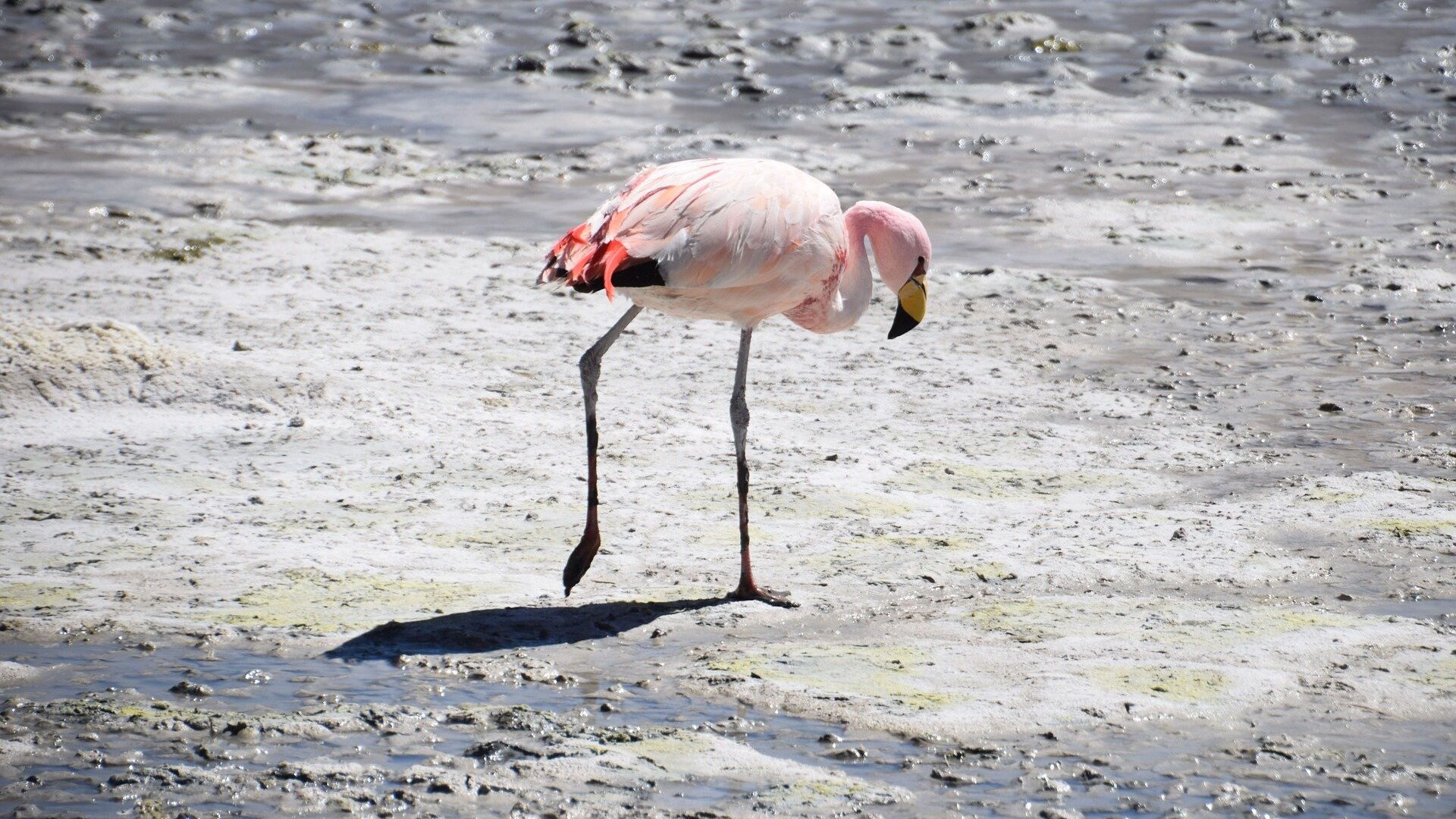https://sputnikglobe.com/20220401/flamingo-spotted-off-texas-coast-17-years-after-its-escape-from-a-zoo-1094405591.html
Flamingo Spotted off Texas Coast, 17 Years After its Escape from a Zoo
Flamingo Spotted off Texas Coast, 17 Years After its Escape from a Zoo
Sputnik International
Greater flamingos are not native to the United States, but the birds’ non-migratory lifestyle and unique look make them popular attractions at zoos across the... 01.04.2022, Sputnik International
2022-04-01T19:41+0000
2022-04-01T19:41+0000
2022-04-01T19:42+0000
us
zoo
society
flamingos
https://cdn1.img.sputnikglobe.com/img/105004/03/1050040348_0:100:1921:1180_1920x0_80_0_0_eee15d7acc2cece0a4a08ac95951e902.jpg
A greater flamingo that escaped a Kansas zoo 17 years ago during a storm has been spotted off the Gulf Coast of Texas.Flamingo No. 492, lovingly nicknamed ‘Pink Floyd’ by its former captors, was spotted by fishing guide David Foreman and a friend in Port Lavaca. He had spent years telling visitors that any flamingos they thought they saw were actually roseate spoonbills.Roseate spoonbills share signature pink feathers with flamingos, but have shorter legs and a different beak profile.Pink Floyd and another Flamingo, no. 347, escaped the Sedgwick County Zoo during a storm in 2005. Zoo employees had not yet clipped the birds’ wings, enabling the escape. No. 347 has not been seen since.But Pink Floyd, originally from Africa, has been exploring America since its release. The bird has been spotted in Wisconsin, Louisiana and Texas over the years. It was three years old when it escaped, which would put it in its 20s today. Flamingos can live into their 40s in the wild.Foreman captured video of the bird, which has been shared on Texas’s Park and Wildlife Twitter account.https://twitter.com/TPWDnews/status/1508434039992160265Officials were able to confirm that the flamingo is indeed no. 492 by spotting the bird’s leg band identifier on the video, according to local news reports.According to Paul Rose, co-chair for the flamingo specialists of the International Union for Conservation of Nature via The Guardian, flamingos don’t migrate seasonally. Instead, they are considered “itinerant nomads” that move only when needed.Flamingos are social animals, so while the Texas Gulf Coast provides the bird with warm temperatures, food and the shallow wetlands flamingos prefer, it is missing out on the companionship it would have received in its natural habitat or the zoo.In 2006, no. 492 was spotted with a Caribbean flamingo who likely made its way to the United States on the winds from a tropical storm, but the two birds have not been spotted together since 2013.There are no plans to recapture Pink Floyd because, according to local news reports, zoo officials say it would be difficult to do without disturbing local wildlife.
Sputnik International
feedback@sputniknews.com
+74956456601
MIA „Rosiya Segodnya“
2022
News
en_EN
Sputnik International
feedback@sputniknews.com
+74956456601
MIA „Rosiya Segodnya“
Sputnik International
feedback@sputniknews.com
+74956456601
MIA „Rosiya Segodnya“
us, zoo, society, flamingos
us, zoo, society, flamingos
Flamingo Spotted off Texas Coast, 17 Years After its Escape from a Zoo
19:41 GMT 01.04.2022 (Updated: 19:42 GMT 01.04.2022) Greater flamingos are not native to the United States, but the birds’ non-migratory lifestyle and unique look make them popular attractions at zoos across the nation.
A greater flamingo that escaped a Kansas zoo 17 years ago during a storm has been spotted off the Gulf Coast of Texas.
Flamingo No. 492, lovingly nicknamed ‘Pink Floyd’ by its former captors, was spotted by fishing guide David Foreman and a friend in Port Lavaca. He had spent years telling visitors that any flamingos they thought they saw were actually roseate spoonbills.
Roseate spoonbills share signature pink feathers with flamingos, but have shorter legs and a different beak profile.
“It was just one of those humbling moments,” Foreman
told The Guardian, “where you’ve told all these people over the years that there’s no flamingos in Texas, and, damn, here’s a flamingo.”
Pink Floyd and another Flamingo, no. 347, escaped the Sedgwick County Zoo during a storm in 2005. Zoo employees had not yet clipped the birds’ wings, enabling the escape. No. 347 has not been seen since.
But Pink Floyd, originally from Africa, has been exploring America since its release. The bird has been spotted in Wisconsin, Louisiana and Texas over the years. It was three years old when it escaped, which would put it in its 20s today. Flamingos can live into their 40s in the wild.
Foreman captured video of the bird, which has been shared on Texas’s Park and Wildlife Twitter account.
Officials were able to confirm that the flamingo is indeed no. 492 by spotting the bird’s leg band identifier on the video, according to
local news reports.
According to Paul Rose, co-chair for the flamingo specialists of the International Union for Conservation of Nature via The Guardian, flamingos don’t migrate seasonally. Instead, they are considered “itinerant nomads” that move only when needed.
“They will leave a particular area for a new area if food resources are not plentiful, or if they need to go and breed,” Rose told The Guardian. “So if this flamingo had found everything it required in one particular wetland, he would stay there. That’s why they’re generally quite easy birds to cater for in the zoo.”
Flamingos are social animals, so while the Texas Gulf Coast provides the bird with warm temperatures, food and the shallow wetlands flamingos prefer, it is missing out on the companionship it would have received in its natural habitat or the zoo.
In 2006, no. 492 was spotted with a Caribbean flamingo who likely made its way to the United States on the winds from a tropical storm, but the two birds have not been spotted together since 2013.
There are no plans to recapture Pink Floyd because, according to local news reports, zoo officials say it would be difficult to do without disturbing local wildlife.



